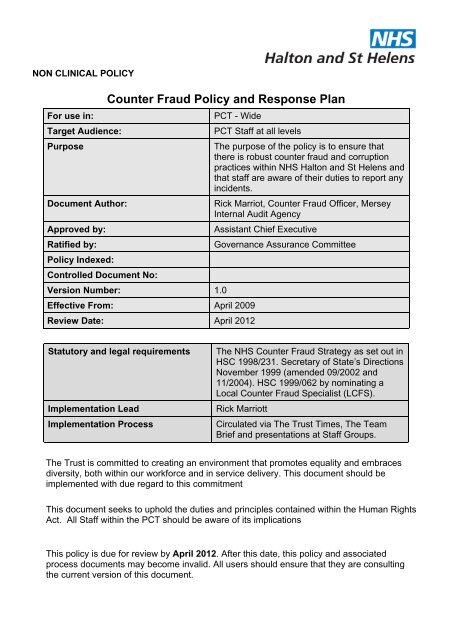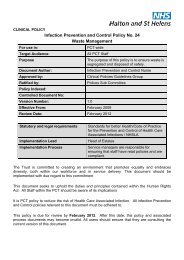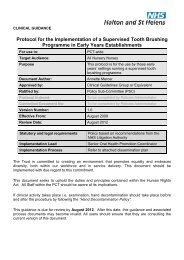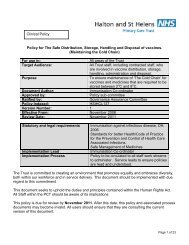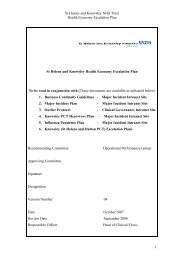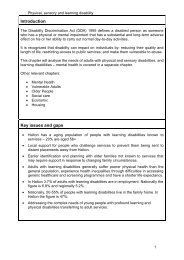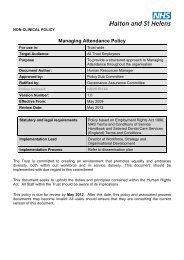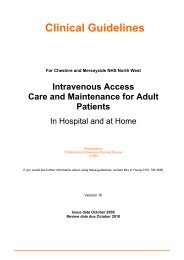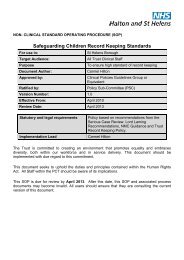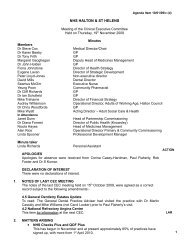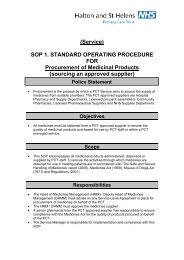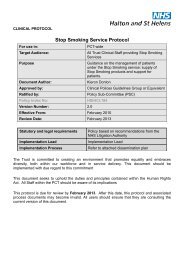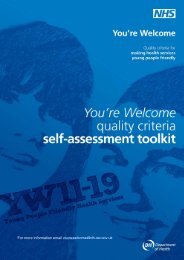NON CLINICAL POLICY - Halton and St Helens PCT
NON CLINICAL POLICY - Halton and St Helens PCT
NON CLINICAL POLICY - Halton and St Helens PCT
Create successful ePaper yourself
Turn your PDF publications into a flip-book with our unique Google optimized e-Paper software.
<strong>NON</strong> <strong>CLINICAL</strong> <strong>POLICY</strong><br />
For use in:<br />
Target Audience:<br />
Purpose<br />
Document Author:<br />
Approved by:<br />
Ratified by:<br />
Policy Indexed:<br />
Controlled Document No:<br />
Counter Fraud Policy <strong>and</strong> Response Plan<br />
Version Number: 1.0<br />
<strong>PCT</strong> - Wide<br />
Effective From: April 2009<br />
Review Date: April 2012<br />
<strong>PCT</strong> <strong>St</strong>aff at all levels<br />
The purpose of the policy is to ensure that<br />
there is robust counter fraud <strong>and</strong> corruption<br />
practices within NHS <strong>Halton</strong> <strong>and</strong> <strong>St</strong> <strong>Helens</strong> <strong>and</strong><br />
that staff are aware of their duties to report any<br />
incidents.<br />
Rick Marriot, Counter Fraud Officer, Mersey<br />
Internal Audit Agency<br />
Assistant Chief Executive<br />
Governance Assurance Committee<br />
<strong>St</strong>atutory <strong>and</strong> legal requirements<br />
Implementation Lead<br />
Implementation Process<br />
The NHS Counter Fraud <strong>St</strong>rategy as set out in<br />
HSC 1998/231. Secretary of <strong>St</strong>ate’s Directions<br />
November 1999 (amended 09/2002 <strong>and</strong><br />
11/2004). HSC 1999/062 by nominating a<br />
Local Counter Fraud Specialist (LCFS).<br />
Rick Marriott<br />
Circulated via The Trust Times, The Team<br />
Brief <strong>and</strong> presentations at <strong>St</strong>aff Groups.<br />
The Trust is committed to creating an environment that promotes equality <strong>and</strong> embraces<br />
diversity, both within our workforce <strong>and</strong> in service delivery. This document should be<br />
implemented with due regard to this commitment<br />
This document seeks to uphold the duties <strong>and</strong> principles contained within the Human Rights<br />
Act. All <strong>St</strong>aff within the <strong>PCT</strong> should be aware of its implications<br />
This policy is due for review by April 2012. After this date, this policy <strong>and</strong> associated<br />
process documents may become invalid. All users should ensure that they are consulting<br />
the current version of this document.
Key individuals involved in developing the document<br />
Name<br />
Designation<br />
Mike Treharne<br />
Director of Financial <strong>St</strong>rategy<br />
Debbie Fairclough<br />
Assistant Chief Executive<br />
Circulated to the following for comments<br />
Committee<br />
Committee<br />
Members of the Policy Sub Committee<br />
Members of the Clinical Guidelines Group<br />
Audit Committee<br />
Individual<br />
Name<br />
Designation<br />
Page 2 of 26
Table of Contents<br />
COUNTER FRAUD <strong>POLICY</strong> AND RESPONSE PLAN ................................................................4<br />
INTRODUCTION .........................................................................................................................5<br />
WHO THIS DOCUMENT APPLIES TO........................................................................................6<br />
<strong>POLICY</strong>........................................................................................................................................6<br />
LEGISLATION .............................................................................................................................7<br />
PUBLIC SERVICE VALUES ........................................................................................................8<br />
ROLES AND RESPONSIBILITIES ............................................................................................10<br />
FRAUD RESPONSE PLAN .......................................................................................................12<br />
REPORTING FRAUD ................................................................................................................12<br />
APPENDIX A .............................................................................................................................17<br />
APPENDIX B .............................................................................................................................18<br />
APPENDIX C ...............................................................................................................................1<br />
APPENDIX D ...............................................................................................................................4<br />
APPENDIX E ...............................................................................................................................6<br />
APPENDIX F................................................................................................................................1<br />
Page 3 of 26
COUNTER FRAUD <strong>POLICY</strong> AND RESPONSE PLAN<br />
This Policy document provides NHS <strong>Halton</strong> & <strong>St</strong> <strong>Helens</strong> with a policy <strong>and</strong> a response plan for<br />
dealing with suspected incidents of Fraud <strong>and</strong> Corruption. The policy is designed to minimise<br />
loss to the <strong>PCT</strong> by deterring, preventing <strong>and</strong> detecting fraud <strong>and</strong> providing effective action<br />
against it. The policy provides clear procedures for reporting suspected fraud or corruption<br />
for: employees, contractors, non executives, suppliers, patients, employees <strong>and</strong> committee<br />
members of organisations we fund. The work to counter fraud within NHS <strong>Halton</strong> & <strong>St</strong><br />
<strong>Helens</strong> is extremely important. The vast majority of people who work in the NHS are honest<br />
<strong>and</strong> professional <strong>and</strong> they find it unacceptable that fraud committed by a minority ultimately<br />
leads to a reduction in resources available for patient care. The <strong>PCT</strong> is committed to<br />
protecting the public money it looks after <strong>and</strong> this means preventing fraud so that more<br />
money goes into health services.<br />
We are all the victims of fraud in public services <strong>and</strong> therefore have a joint responsibility.<br />
Money provided by taxpayers is stolen, <strong>and</strong> we are denied the proper level of service that we<br />
are entitled to expect. Fraud is theft <strong>and</strong> is morally wrong in itself, but in the case of fraud<br />
within public services, fraud deprives society of resources which could otherwise be used for<br />
better systems <strong>and</strong> better services – an NHS for the future. Counter fraud work should<br />
therefore be seen not as an end in itself, but as a means of making the best possible use of<br />
NHS resources. (NHS Counter Fraud <strong>St</strong>rategy,1998)<br />
Page 4 of 26
INTRODUCTION<br />
One of the fundamental principles of public sector organisations is the proper use of public<br />
funds. The size <strong>and</strong> nature of our services put us at risk to loss due to Fraud <strong>and</strong> Corruption<br />
both from within NHS <strong>Halton</strong> & <strong>St</strong> <strong>Helens</strong> <strong>and</strong> outside it. This document sets out the <strong>PCT</strong>’s<br />
policy for identifying suspected illegalities that may be occurring.<br />
For simplicity, all such offences are referred to in the policy <strong>and</strong> response plan as “Fraud”,<br />
except where the context indicates otherwise.<br />
NHS <strong>Halton</strong> & <strong>St</strong> <strong>Helens</strong> is committed to ensuring that fraud <strong>and</strong> corruption is reduced to the<br />
lowest level of risk. However, where fraud <strong>and</strong> corruption does occur the <strong>PCT</strong> will deal with it in<br />
a firm <strong>and</strong> controlled manner by rigorous investigation of such cases. An important part of this<br />
approach has been the introduction of a Counter Fraud Policy.<br />
In 1998, the Department of Health launched the NHS Counter Fraud <strong>St</strong>rategy. Over the last ten<br />
years, success in tackling NHS fraud has meant that:<br />
£811million has been spent on patient care.<br />
There have been a total of 422 successful criminal prosecutions.<br />
Recovery from fraud cases to the amount of £51,416,766.<br />
Pharmaceutical fraud has been reduced by 60% to £47million.<br />
Patient Fraud has been reduced by 55% from £171million to £76million<br />
NHS <strong>Halton</strong> & <strong>St</strong> <strong>Helens</strong> endorses the NHS Counter Fraud <strong>St</strong>rategy as set out in HSC<br />
1998/231. The <strong>PCT</strong> has complied with the Secretary of <strong>St</strong>ate’s Directions November 1999<br />
(amended 09/2002 <strong>and</strong> 11/2004) <strong>and</strong> HSC 1999/062 by nominating a Local Counter Fraud<br />
Specialist (LCFS).<br />
Page 5 of 26
WHO THIS DOCUMENT APPLIES TO<br />
This Policy applies to all employees <strong>and</strong> may also be used by Locum, Agency staff, contractors<br />
or suppliers to report any concerns that they may have.<br />
Upon implementing this policy, managers must ensure that all staff are treated fairly <strong>and</strong> within<br />
the provisions of the <strong>PCT</strong>’s Equal Opportunities Policy. Attention should be paid to ensure the<br />
Policy is understood by all staff. Where there are barriers to this, staff should be provided with<br />
further training where an individual’s literacy or use of English is weak or where they have little<br />
experience of working life.<br />
<strong>POLICY</strong><br />
Those individuals who exploit the system are not only cheating the tax payers, but are depriving<br />
patients of the care they require. Fraud against the <strong>PCT</strong> means there is less money to spend in<br />
health services.<br />
NHS <strong>Halton</strong> & <strong>St</strong> <strong>Helens</strong> needs every member of staff to report Fraud if they suspect it being<br />
committed. If you suspect a Fraud it is your duty contact the nominated officers who are listed<br />
within this document <strong>and</strong> give them the details. Every case is treated in the strictest of<br />
confidence <strong>and</strong> you can provide information anonymously using the Confidential Fraud Hotline.<br />
If you have any concerns regarding Fraud or Corruption occurring within the <strong>PCT</strong> then please<br />
report it by contacting the:<br />
- Director of Financial <strong>St</strong>rategy: Mike Treharne<br />
Tel: 0151 495 5171<br />
Email: mike.treharne@hsthpct.nhs.uk<br />
- Local Counter Fraud Officer: Rick Marriott<br />
Tel: 0151 285 4523 Mobile: 07825815018<br />
Email: rick.marriott@miaa.nhs.uk<br />
- Counter Fraud Team [MIAA] on 0151 285 4500<br />
- Reporting your concerns using the on-line Intranet Referral Form<br />
- Calling the national NHS Fraud <strong>and</strong> Corruption Reporting Line on:<br />
0800 028 40 60<br />
NHS <strong>Halton</strong> & <strong>St</strong> <strong>Helens</strong> wishes to encourage anyone having reasonable grounds of<br />
suspecting Fraud being committed to report it. It is the <strong>PCT</strong>’s policy, which will be rigorously<br />
Page 6 of 26
einforced that no employee will suffer in any way as a result of reporting reasonably held<br />
suspicions.<br />
All members of staff can therefore be confident that they will not suffer in any way as a result<br />
of reporting reasonably held suspicions. For the purpose of this policy ‘reasonably held<br />
suspicions’ shall mean any suspicions other than those which are totally groundless or rose<br />
maliciously.<br />
LEGISLATION<br />
FRAUD is not a victimless crime; in fact defrauding the NHS organisations of money takes vital<br />
resources away from patient care.<br />
Fraudulent activity can be committed in many ways including deception, bribery, forgery <strong>and</strong><br />
counterfeiting. (See Appendix A) The Fraud Act 2006 came in to force in January 2007 which<br />
created new offences relating to Fraud. (See Appendix B) Before this legislative act was<br />
introduced there were no specific offences of ‘Fraud’. However legislation such as Theft Acts of<br />
1968 <strong>and</strong> amended in 1978 <strong>and</strong> 1996, Forgery <strong>and</strong> Counterfeiting Act 1981, Criminal Attempts<br />
Act 1981 was used. Subsequently, any fraudulent acts committed prior to January 2007 would<br />
be tried under the previous fraud related acts.<br />
Type of NHS Fraud - There is not one type of NHS Fraud that can be committed but a number.<br />
There is an enormous variation of how Fraud is committed <strong>and</strong> this very much depends on the<br />
individual’s intent <strong>and</strong> the opportunity that may exist. To assist in underst<strong>and</strong>ing the risk of<br />
fraud in the NHS, the following is provided to example some familiar NHS related fraud.<br />
Working at a secondary employer when absent through sickness from the primary employer.<br />
Submission of Timesheets which have false representation.<br />
Submission of false travel/mileage claims.<br />
Patients claiming for exemption from payment when not entitled.<br />
Falsely representing Quality Outcome Framework [QOF] achievements.<br />
Securing employment by submitting false employment applications/CVs.<br />
Corruption is an extremely serious offence which strikes at the heart of public confidence in<br />
administrative affairs. The laws dealing with corrupt activity in the UK are to be found in the<br />
common law offence of bribery <strong>and</strong> in three Acts of Parliament, namely the Public Bodies<br />
Corrupt Practices Act 1889 <strong>and</strong> the Prevention of Corruption Acts of 1906 <strong>and</strong> 1916.<br />
Generally, corruption can be defined as:<br />
Page 7 of 26
“the receiving or offering of any undue reward by or to any person in public office in<br />
order to influence that person to act contrary to the rules of honesty <strong>and</strong> integrity.”<br />
The Acts make corrupt activity in the public sector a criminal offence <strong>and</strong> the 1916 Act includes<br />
reversal of the normal presumption of innocence so that where a payment is made to an<br />
employee of a public body it is for the defence to prove that the payment was not illegal.<br />
Main areas of activity which are susceptible to corruption include the awarding of contracts <strong>and</strong><br />
disposal of assets.<br />
PUBLIC SERVICE VALUES<br />
The highest st<strong>and</strong>ards of corporate <strong>and</strong> personal conduct, based around the recognition that<br />
Patients come first has been a requirement of the NHS since its inception. The three<br />
fundamental public service values are as follows:<br />
Accountability<br />
Everything done by those who work at NHS <strong>Halton</strong> & <strong>St</strong><br />
<strong>Helens</strong> must be able to st<strong>and</strong> the tests of Parliamentary<br />
scrutiny, public judgments on property <strong>and</strong> professional<br />
codes of conduct.<br />
Probity<br />
Absolute honesty <strong>and</strong> integrity should be exercised in<br />
dealing with NHS patients, assets, employees, suppliers<br />
<strong>and</strong> customers.<br />
Openness<br />
NHS <strong>Halton</strong> & <strong>St</strong> <strong>Helens</strong> actions should be sufficiently<br />
public <strong>and</strong> transparent to promote confidence between the<br />
<strong>PCT</strong> <strong>and</strong> its patients, our employees <strong>and</strong> the public.<br />
In addition to the above, all those who work for or are in<br />
contract with the <strong>PCT</strong> should adhere to the following<br />
principals:<br />
Professionalism<br />
Employees should maintain the highest st<strong>and</strong>ards of<br />
Professionalism, in the best tradition of the existing NHS<br />
professions. Specifically, this should cover areas of<br />
personal conduct, expertise <strong>and</strong> all work taken to counter<br />
Fraud. Any information or evidence must be obtained in a<br />
proper legal manner <strong>and</strong> recorded accordingly. The<br />
reputation of the NHS must be paramount <strong>and</strong> officers must<br />
not bring it into disrepute by any of their actions.<br />
Page 8 of 26
Objectivity<br />
Employees should undertake all work with an open mind<br />
<strong>and</strong> ensure that any evidence or information obtained is<br />
assessed without preconceptions. Consideration should be<br />
given to all interpretations that may be placed on such<br />
evidence or information.<br />
Fairness Employees should act in a courteous, polite <strong>and</strong><br />
considerate manner <strong>and</strong> conduct all work applying proper<br />
st<strong>and</strong>ards of fairness <strong>and</strong> without discrimination in<br />
accordance with current Equal Opportunities Policy.<br />
Expertise<br />
Employees have a duty to maintain the highest level of<br />
expertise <strong>and</strong> to ensure that this is applied thoroughly <strong>and</strong><br />
comprehensively in every aspect of counter Fraud work<br />
that is undertaken.<br />
Propriety<br />
Employees have a duty to ensure that they meet the<br />
highest st<strong>and</strong>ards of propriety. It must be ensured that in all<br />
personal <strong>and</strong> financial areas, the integrity of those<br />
undertaking counter Fraud work is never undermined.<br />
Proper accurate records which meet the legislative<br />
requirements must be kept on all aspects of work with<br />
particular reference to issues of confidentiality so that<br />
information is only passed to those who are entitled to<br />
receive it.<br />
Vision<br />
Employees should ensure that the work undertaken is<br />
understood in the context of all action taken to counter<br />
Fraud <strong>and</strong> corruption <strong>and</strong> to develop an anti-fraud culture.<br />
This should also include promoting Fraud awareness<br />
generally, encouraging the active participation of other<br />
relevant agencies <strong>and</strong> the implementation of a clear multiagency<br />
approach.<br />
NHS <strong>Halton</strong> & <strong>St</strong> <strong>Helens</strong> supports <strong>and</strong> promotes these principles.<br />
Page 9 of 26
ROLES AND RESPONSIBILITIES<br />
This section states the roles <strong>and</strong> responsibilities of NHS <strong>Halton</strong> <strong>and</strong> <strong>St</strong> <strong>Helens</strong> employees <strong>and</strong><br />
other relevant parties in reporting fraud or other irregularities.<br />
Director of Financial <strong>St</strong>rategy<br />
The Director of Financial <strong>St</strong>rategy has a legal responsibility to make sure that fraud <strong>and</strong><br />
corruption are prevented, detected <strong>and</strong> investigated. Combating Fraud <strong>and</strong> Corruption requires<br />
an underst<strong>and</strong>ing of how <strong>and</strong> why it happens, the ways in which it can be minimized <strong>and</strong> how to<br />
professionally investigate it; therefore the Director of Financial <strong>St</strong>rategy nominates a LCFS to<br />
tackle fraud <strong>and</strong> corruption within NHS <strong>Halton</strong> & <strong>St</strong> <strong>Helens</strong>.<br />
Director of Workforce Development<br />
There is a protocol in place which sets out the agreed procedures between the LCFS, Director<br />
of Financial <strong>St</strong>rategy <strong>and</strong> Director of Workforce Development where NHS <strong>Halton</strong> & <strong>St</strong> <strong>Helens</strong><br />
staff are involved. The Director of Workforce Development will advise those involved in any<br />
investigation of requirements relating to matters of employment law <strong>and</strong> in other procedural<br />
matters, such as disciplinary <strong>and</strong> complaints procedures.<br />
Local Counter Fraud Specialist (LCFS)<br />
The LCFS is an experienced <strong>and</strong> accredited (professionally qualified) counter fraud specialist.<br />
In essence, the role of the LCFS is to respond to <strong>and</strong> proactively tackle risks <strong>and</strong> occurrences of<br />
fraud <strong>and</strong> corruption at the <strong>PCT</strong> by providing a robust <strong>and</strong> effective prevention, detection <strong>and</strong><br />
Investigation function. The LCFS is responsible for ensuring that the <strong>PCT</strong> achieves the seven<br />
specific objectives of the National Counter Fraud <strong>St</strong>rategy at NHS <strong>Halton</strong> & <strong>St</strong> <strong>Helens</strong>:<br />
<br />
<br />
<br />
<br />
<br />
<br />
<br />
<br />
the creation of an anti-fraud culture;<br />
maximum deterrence of fraud;<br />
successful prevention of fraud which cannot be deterred;<br />
prompt detection of fraud which cannot be prevented;<br />
professional investigation of detected fraud;<br />
effective sanctions, including appropriate legal action against people<br />
committing fraud;<br />
Effective methods for seeking redress in respect of money defrauded.<br />
The LCFS reports to the Director of Financial <strong>St</strong>rategy, but any member of the <strong>PCT</strong> staff can<br />
speak to <strong>and</strong> ask for advice from the LCFS. The LCFS is authorised to receive reports of<br />
suspected fraud from anyone, whether an employee of NHS <strong>Halton</strong> & <strong>St</strong> <strong>Helens</strong>, independent<br />
contractors, patients <strong>and</strong> other third parties. <strong>St</strong>aff have a responsibility to the <strong>PCT</strong> to raise their<br />
genuine concerns. Under Secretary of <strong>St</strong>ate Directions <strong>and</strong> NHS <strong>Halton</strong> & <strong>St</strong> <strong>Helens</strong><br />
<strong>St</strong><strong>and</strong>ing Financial Instructions [SFIs], the LCFS is responsible for investigating allegations of<br />
Fraud <strong>and</strong> Corruption at the <strong>PCT</strong>. The LCFS employs a risk-based methodology to enable the<br />
<strong>PCT</strong> to target resources at high risk areas <strong>and</strong> throughout the year undertakes proactive<br />
reviews in these areas which can detect Fraud. Such reviews together with investigations<br />
ensure the LCFS identifies <strong>and</strong> counters vulnerabilities within the <strong>PCT</strong>’s systems by<br />
Page 10 of 26
implementing effective prevention, detection <strong>and</strong> corrective controls that reduce the likelihood of<br />
Fraud.<br />
Audit Committee<br />
The Audit Committee’s primary role is to conclude upon the adequacy <strong>and</strong> effective<br />
operation of the organisation’s overall internal control system. In performing that role the<br />
Committee’s work will predominantly focus upon the framework of risks, controls <strong>and</strong><br />
related assurances that underpin the delivery of the organisation’s objectives. In<br />
respect of fraud the Committee will review the adequacy of: the policies <strong>and</strong> procedures for<br />
all work related to fraud <strong>and</strong> corruption as set out in Secretary of <strong>St</strong>ate Directions <strong>and</strong> as<br />
required by the Counter Fraud <strong>and</strong> Security Management Service. In support of this role<br />
the Committee will receive reports from the LCFS on progress regarding fraud<br />
awareness/detection <strong>and</strong> updates regarding investigations.<br />
Employees <strong>and</strong> Contractors<br />
For the purposes of this policy, Employees includes NHS <strong>Halton</strong> <strong>and</strong> <strong>St</strong> <strong>Helens</strong> staff, Board,<br />
Executive <strong>and</strong> Non-Executive Members (including co opted Members) <strong>and</strong> Honorary Members<br />
to the board.<br />
All employees <strong>and</strong> contractors of NHS <strong>Halton</strong> & <strong>St</strong> <strong>Helens</strong> are individually responsible for:<br />
Securing the property of NHS <strong>Halton</strong> & <strong>St</strong> <strong>Helens</strong><br />
Avoiding loss<br />
Confirming with the rules <strong>and</strong> the regulations contained in the <strong>PCT</strong>’s Policies <strong>and</strong> Procedures<br />
NHS <strong>Halton</strong> & <strong>St</strong> <strong>Helens</strong> employees are required to follow any Code of Conduct related to their<br />
personal professional qualifications.<br />
All offers of gifts or hospitality, which are in any way related to the <strong>PCT</strong>’s duties, must be<br />
declared by the employee to their line manager <strong>and</strong> acceptance of offers of gifts or hospitality is<br />
required to be registered in line with NHS <strong>Halton</strong> & <strong>St</strong> <strong>Helens</strong> policy.<br />
NHS <strong>Halton</strong> & <strong>St</strong> <strong>Helens</strong> employees must declare any possible conflicts of interest which they<br />
may have in contracts entered into with the <strong>PCT</strong> <strong>and</strong> these must be noted in a register<br />
maintained for that purpose. All non executives have to register potential conflicts between their<br />
duties <strong>and</strong> personal or professional lives.<br />
Please refer to the <strong>PCT</strong>’s ‘<strong>St</strong><strong>and</strong>ards of Business Conduct Policy’ for more guidance on the<br />
st<strong>and</strong>ards of business conduct expected of all employees.<br />
When an employee suspects that there has been fraud or corruption, they must report the<br />
matter to the nominated LCFS. See Section 7.3 below.<br />
Any employee in breach of these regulations may be liable to disciplinary action<br />
including summary dismissal.<br />
Page 11 of 26
FRAUD RESPONSE PLAN<br />
NHS <strong>Halton</strong> & <strong>St</strong> <strong>Helens</strong> is committed to tackling Fraud <strong>and</strong> Corruption. When fraud is<br />
discovered there is a need for clear, prompt <strong>and</strong> appropriate action. Therefore, having a Fraud<br />
Response plan increases the likelihood that the crisis will be managed effectively. The<br />
response will be effective <strong>and</strong> organised <strong>and</strong> will rely on the principles contained within this<br />
section.<br />
The <strong>PCT</strong> will be robust in dealing with any Fraud, <strong>and</strong> can be expected to deal timely <strong>and</strong><br />
thoroughly with any person who attempts to defraud the <strong>PCT</strong> or who engages in corrupt<br />
practices, whether they are non executives, employees, suppliers, patients or unrelated third<br />
parties. Appendix C is an overview of the fraud response process.<br />
REPORTING FRAUD<br />
What you should do if you suspect fraud<br />
If you discover or suspect a colleague, patient or other person of committing fraud you must:<br />
Immediately tell the ‘nominated officers’: Director of Financial <strong>St</strong>rategy or LCFS.<br />
Secure records in your possession.<br />
Record details of relevant events.<br />
Await further advice (the nominated officers will decide on the next course of action <strong>and</strong> advise<br />
you accordingly).<br />
If the concern or query involves an executive director, the matter should be reported to the<br />
Chair of the Audit Committee <strong>and</strong> passed to the LCFS to investigate.<br />
Time may be of the utmost importance to prevent further loss to the <strong>PCT</strong>. <strong>St</strong>aff/contractors<br />
should report their first suspicions <strong>and</strong> not undertake lengthy consideration of alternative<br />
explanations – be assured that any subsequent investigation will be of the highest professional<br />
st<strong>and</strong>ard. In addition, everything reported to the ‘nominated officers’ is treated in the strictest<br />
confidence <strong>and</strong> an employee can request to remain anonymous. Well intentioned employees<br />
making a referral will be protected from any unacceptable behaviour from the subject of the<br />
referral or anyone else.<br />
What not to do<br />
<br />
<br />
<br />
<br />
Do not confront ‘suspect’<br />
Do not assume only one person is involved<br />
Do not talk amongst colleagues, friends about your suspicions, concerns or queries<br />
Do not contact any external organisation (only the Director of Financial <strong>St</strong>rategy or the<br />
LCFS are permitted to make such contact).<br />
The reason for the above is twofold:<br />
Page 12 of 26
To ensure evidence is secured against loss, destruction <strong>and</strong><br />
contamination<br />
nothing is done that could give rise to an action for sl<strong>and</strong>er or libel<br />
Whistle blowing/ Public Interests Disclosure Act 1998<br />
Whistle blowing is when an employee blows the whistle by informing their employer, a<br />
regulator, customers, the police or the media about suspected dangerous or illegal activity that<br />
they are aware of through their work e.g. concerns about health <strong>and</strong> safety risks, potential<br />
environmental problems, fraud, corruption, deficiencies in the care of vulnerable people, coverups<br />
<strong>and</strong> many other problems. Often it is only through whistle blowing that this information<br />
comes to light <strong>and</strong> can be addressed before real damage is done. Whistle blowing is a valuable<br />
activity which can positively influence all of our lives. NHS <strong>Halton</strong> & <strong>St</strong> <strong>Helens</strong> fully endorses the<br />
provisions of the Public Interest Disclosure Act 1998 <strong>and</strong> wishes to encourage anyone having<br />
reasonable suspicions of fraud to report them. The <strong>PCT</strong>’s Whistle blowing Policy/Raising<br />
Concerns at the Workplace, which will be rigorously enforced, is that no employee should suffer<br />
because of reporting reasonably held suspicions under the provisions of the Act.<br />
National Fraud <strong>and</strong> Corruption Hotline<br />
If you are unable to talk to anyone within the <strong>PCT</strong> or the LCFS then staff/contractors can<br />
contact the National Fraud <strong>and</strong> Corruption reporting line by telephoning<br />
0800 028 40 60<br />
Your call will be treated in confidence <strong>and</strong> you can remain anonymous.<br />
Page 13 of 26
INVESTIGATION OF FRAUD<br />
Where a referral concerning fraud or corruption has been made to the Director of Financial<br />
<strong>St</strong>rategy, the Director shall inform the LCFS at the first opportunity. There is a protocol for the<br />
referral, acknowledgement, investigation <strong>and</strong> reporting of allegations.<br />
On receipt of a referral/ allegation of suspected fraud, the LCFS will assess the allegation to<br />
determine a course of action. This may involve making preliminary enquiries such as obtaining<br />
information from NHS <strong>Halton</strong> & <strong>St</strong> <strong>Helens</strong> systems.<br />
Where appropriate, the LCFS will seek agreement from the Director of Financial <strong>St</strong>rategy to<br />
carry out an investigation.<br />
The LCFS is responsible for investigating all instances of fraud at NHS <strong>Halton</strong> & <strong>St</strong> <strong>Helens</strong> on<br />
behalf of the Director of Financial <strong>St</strong>rategy.<br />
The LCFS will regularly report to the Director of Financial <strong>St</strong>rategy on all fraud cases<br />
investigated <strong>and</strong> at particular stages of individual investigations.<br />
In addition, the LCFS will provide the Audit committee with quarterly updates as to the<br />
progression of investigations.<br />
Depending upon the nature of the investigation, the LCFS will normally work closely with<br />
management <strong>and</strong> other agencies such as the Police, to ensure that all matters are properly<br />
investigated <strong>and</strong> reported upon. Basically, the circumstances of each case will dictate who will<br />
be involved <strong>and</strong> when.<br />
The detailed arrangements for the investigations of any suspected fraud or corruption are<br />
contained in the National Fraud <strong>and</strong> Corruption Manual <strong>and</strong> within NHS <strong>Halton</strong> & <strong>St</strong> <strong>Helens</strong><br />
policies<br />
E.g. Disciplinary, <strong>St</strong><strong>and</strong>ing Financial Orders. The LCFS will record the progress of the<br />
investigation <strong>and</strong> conduct the investigation in accordance with the legal codes of practices<br />
(Police <strong>and</strong> Criminal Evidence Act 1994, Regulation of Investigatory Powers Act 2000, Criminal<br />
Procedures <strong>and</strong> Investigation Act 1996. <strong>and</strong> other legislative requirements (e.g. Data Protection<br />
Act 1998).<br />
On the conclusion of the investigation the LCFS will report findings <strong>and</strong> recommendations to the<br />
Director of Financial <strong>St</strong>rategy. The Director of Financial <strong>St</strong>rategy is the sole person who can<br />
determine whether or not any formal action is justified <strong>and</strong> what form such action takes;<br />
however, guidance can be sought from the Chief Executive <strong>and</strong> LCFS.<br />
If the Director of Financial <strong>St</strong>rategy decides that formal action is to be taken against the<br />
subject(s) of an investigation, the LCFS will comply with the CFSMS Applying Appropriate<br />
Sanctions Consistently Policy. This will involve using an appropriate combination of the<br />
sanctions described below:<br />
Page 14 of 26
Disciplinary action - NHS <strong>Halton</strong> & <strong>St</strong> <strong>Helens</strong> <strong>and</strong>/or professional regulatory body<br />
(warning, dismissal etc)<br />
Civil remedy – recover money, interest <strong>and</strong> costs<br />
Criminal prosecution – which may result in imprisonment, community penalty, a fine,<br />
confiscation or compensation<br />
The use of parallel sanctions or ‘triple-track’ approach helps to maximise the recovery of NHS<br />
funds <strong>and</strong> assets while minimising duplication of work.<br />
The NHS <strong>Halton</strong> & <strong>St</strong> <strong>Helens</strong> Disciplinary Procedures will be used where the outcome of the<br />
investigation indicates improper behaviour on the part of employees. The LCFS shall liaise with<br />
the Director of Workforce Development in providing evidence for Disciplinary Hearings.<br />
Where financial loss has been suffered through fraudulent activity, NHS <strong>Halton</strong> & <strong>St</strong> <strong>Helens</strong> will<br />
pursue the perpetrator for recovery, including taking appropriate legal action. The LCFS shall<br />
liaise with legal representatives <strong>and</strong> attend court as required.<br />
The LCFS will seek authorisation from the Director of Financial <strong>St</strong>rategy if a matter is to be<br />
reported to the Police. The LCFS shall liaise with the police by providing a MG (Prosecution)<br />
File <strong>and</strong> participate in interviews, searches etc. The LCFS shall attend court to give evidence<br />
<strong>and</strong> liaise with the Crown Prosecution Service as required.<br />
The LCFS acts on behalf of NHS <strong>Halton</strong> & <strong>St</strong> <strong>Helens</strong> in the event of any formal action <strong>and</strong> must<br />
ensure there is co-ordination between the various parties involved such as where external legal<br />
advisors are used.<br />
When a fraud or corruption has occurred at the <strong>PCT</strong>, the LCFS will strengthen the control<br />
environment in which the event occurred by identifying <strong>and</strong> addressing any system weaknesses<br />
to reduce the risk of any such an event happening again.<br />
The LCFS is required to advise the NHS Counter Fraud <strong>and</strong> Security Management (CFSMS) of<br />
every investigation <strong>and</strong> refer appropriate matters to CFSMS.<br />
The LCFS shall maintain <strong>and</strong> present to the Director of Financial <strong>St</strong>rategy <strong>and</strong> Audit Committee<br />
a record:<br />
<br />
<br />
Detailing of all reported suspicions;<br />
Detailing of subsequent actions taken <strong>and</strong> conclusions reached.<br />
This record will be reviewed by the Audit Committee at least once a year <strong>and</strong> any significant<br />
matters will be reported to the NHS <strong>Halton</strong> & <strong>St</strong> <strong>Helens</strong> Board. The LCFS will have open access<br />
to the record. The record will be a confidential document <strong>and</strong> accessible only by authorised<br />
officers. The record is subject to the Data Protection Act 1998 particularly in relation to the<br />
retention <strong>and</strong> destruction of personal data.<br />
Page 15 of 26
The Director of Financial <strong>St</strong>rategy is responsible for the smooth running of this protocol <strong>and</strong><br />
where clarification is required his or her decision will be final.<br />
Page 16 of 26
APPENDIX A<br />
RELEVANT COUNTER FRAUD DEFINITIONS<br />
1. The following ‘Definitions’ are provided as information to assist in the<br />
underst<strong>and</strong>ing of fraud terminology:<br />
1.1 Deception (also called beguilement or subterfuge) is the act of<br />
convincing another to believe information that is not true, or not the whole truth as in<br />
certain types of half truths.<br />
Deception involves concepts like propag<strong>and</strong>a, distraction <strong>and</strong>/or concealment. Fiction,<br />
while sometimes manipulative, is not a deception unless it is portrayed as the whole<br />
truth. In many cases it is difficult to distinguish deception from providing unintentionally<br />
wrong information. One of the reasons for this is that a person or an entire organization<br />
may be self deceived.<br />
1.2 Bribery, a form of pecuniary corruption, is an act usually implying money or gift given<br />
that alters the behaviour of the recipient in ways not consistent with the duties of that<br />
person or in breach of law. Bribery constitutes a crime <strong>and</strong> is defined by Blacks Law<br />
dictionary as the offering, giving, receiving or soliciting of any item of value to influence<br />
the actions of an official or other person in discharge of a public or legal duty.<br />
The bribe is the gift bestowed to influence the recipient's conduct. It may be any money,<br />
good, right in action, property, preferment, privilege emolument, object of value,<br />
advantage, or merely a promise or undertaking to induce or influence the action, vote, or<br />
influence of a person in an official or public capacity.<br />
1.3 Forgery is the process of making, adapting, or imitating objects or documents, with the<br />
intent to deceive. The similar crime of Fraud is the crime of deceiving another, including<br />
through the use of objects obtained through forgery. Copies, studio replicas, <strong>and</strong><br />
reproductions are not considered forgeries, though they may later become forgeries<br />
through knowing <strong>and</strong> wilful misrepresentations.<br />
1.4 A counterfeit is an imitation that is made usually with the intent to<br />
deceptively represent its content or origins. The word counterfeit most<br />
frequently describes forged currency or documents, but can also describe<br />
clothing, software, pharmaceuticals, watches, or more recently, cars <strong>and</strong><br />
motorcycles, especially when this results in patent or trademark<br />
infringement.<br />
Page 17 of 26
APPENDIX B<br />
FRAUD RELATED CRIMINAL LEGISLATION<br />
1. The following details elements of criminal legislation relevant to fraud. The detail is<br />
provided for information solely <strong>and</strong> any further actions or underst<strong>and</strong>ing should be<br />
requested from the LCFS.<br />
FRAUD ACT 2006<br />
2. A person is guilty of fraud if a person is in breach of any of the sections listed below<br />
(which provide for different ways of committing the offence):<br />
section 2 (fraud by false representation)<br />
section 3 (fraud by failing to disclose information)<br />
section 4 (fraud by abuse of position)<br />
2.1 A person who is guilty of fraud is liable:<br />
on summary conviction, to imprisonment for a term not exceeding 12<br />
months or to a fine not exceeding the statutory maximum (or to both);<br />
On conviction on indictment, to imprisonment for a term not exceeding 10<br />
years or to a fine (or to both).<br />
2.2 Section 2, Fraud Act 2006: Fraud by false representation - A person is<br />
in breach of this section if a person:<br />
(a) Dishonestly makes a false representation, <strong>and</strong><br />
(b) Intends, by making the representation:<br />
(i) To make a gain for himself or another, or<br />
(ii) To cause loss to another or to expose another to a risk of loss.<br />
• A representation is false if:<br />
(a) It is untrue or misleading, <strong>and</strong><br />
(b) The person making it knows that it is, or might be, untrue or misleading.<br />
• Representation means any representation as to fact or law, including a<br />
representation as to the state of mind of:<br />
(a) The person making the representation, or<br />
(b) Any other person.<br />
Page 18 of 26
• A representation may be express or implied.<br />
• For the purposes of this section a representation may be regarded as made if<br />
it (or anything implying it) is submitted in any form to any system or device designed to<br />
receive, convey or respond to communications (with or without human intervention).<br />
2.3 Section 3, Fraud Act 2006: Fraud by failing to disclose information - A<br />
person is in breach of this section if a person:<br />
(a) Dishonestly fails to disclose to another person information which he<br />
under a legal duty to disclose, <strong>and</strong><br />
is<br />
(b) Intends, by failing to disclose the information:<br />
(i) To make a gain for himself or another, or<br />
(ii) To cause loss to another or to expose another to a risk of loss.<br />
2 .4 Section 4, Fraud Act 2006: Fraud by abuse of position<br />
• A person is in breach of this section if a person:<br />
(a) Occupies a position in which he is expected to safeguard, or not to act against,<br />
the financial interests of another person,<br />
(b) Dishonestly abuses that position, <strong>and</strong><br />
(C) Intends, by means of the abuse of that position:<br />
(i) To make a gain for himself or another, or<br />
(ii) To cause loss to another or to expose another to a risk of loss.<br />
• A person may be regarded as having abused his position even though<br />
conduct consisted of an omission rather than an act.<br />
his<br />
CRIMINAL ATTEMPTS ACT 1981<br />
3. The following concerns attempted criminal offences:<br />
(1) If, with intent to commit an offence to which this section applies, a person does an act<br />
which is more than merely preparatory to the commission of the offence, he is guilty of'<br />
attempting to commit the offence.<br />
(2) A person may be guilty of attempting to commit an offence to which this section<br />
applies even though the facts are such that the commission of the offence is impossible.<br />
Page 19 of 26
(3) In any case where:<br />
(a) Apart from this subsection a person's intention would not be<br />
regarded as having amounted to an intent to commit an offence;<br />
But<br />
THEFT ACT 1968<br />
(b) If the facts of the case had been as he believed them to be, his<br />
intention would be so regarded, then, for the purposes of subsection<br />
(1) above, he shall be regarded as having had an intent to commit<br />
that offence.<br />
(4) This section applies to any offence, which, if it were completed, would<br />
be triable in Engl<strong>and</strong> <strong>and</strong> Wales as an indictable offence, other than:<br />
(a) Conspiracy (at common law or under section 1 of the Criminal<br />
Law Act 1977 or any other enactment);<br />
(b)aiding, abetting, counselling, procuring or suborning the<br />
commission of an offence<br />
(c) Offences under section 4(1) (assisting offenders) or 5(1)<br />
(accepting or agreeing to accept consideration for not disclosing<br />
information about an arrestable offence) of the Criminal Law Act<br />
1967.<br />
4 The following relates to the offence of ‘simple’ theft:<br />
(1) A person is guilty of theft if he dishonestly appropriates property belonging to another<br />
with the intention of permanently depriving the other of it; <strong>and</strong> ‘theft’ <strong>and</strong> ‘steal’ shall be<br />
construed accordingly.<br />
Page 20 of 26
APPENDIX C<br />
FRAUD RESPONSE PLAN<br />
Concerned about Fraud?<br />
Fraud or corruption suspected<br />
Fraud or corruption not<br />
suspected<br />
Inform the LCFS or Director of<br />
Financial <strong>St</strong>rategy<br />
NHS Fraud &corruption<br />
hotline or Public Concern at<br />
Discuss with your Head of<br />
Department<br />
LCFS will assess the referral <strong>and</strong><br />
commence investigation<br />
No Fraud<br />
Fraud<br />
Criminal<br />
Police/Court<br />
Fraud<br />
Civil Court<br />
Fraud<br />
Disciplinary<br />
Hearing<br />
LCFS<br />
closes case<br />
–<br />
No action<br />
Prison,<br />
Community<br />
Penalty, Fine,<br />
Costs,<br />
confiscation/<br />
Compensation<br />
Recovery of<br />
monies,<br />
interest &<br />
costs<br />
Professional<br />
regulatory<br />
body: struck<br />
off, conditions<br />
etc<br />
Dismissal,<br />
verbal or<br />
written<br />
warning<br />
Feedback to the referrer on the<br />
outcome of the allegation
APPENDIX D<br />
FRAUD AND CORRUPTION<br />
‘STAFF STATEMENT’<br />
INTRODUCTION<br />
NHS <strong>Halton</strong> & <strong>St</strong> <strong>Helens</strong> is committed to maintaining an honest, open <strong>and</strong> well intended<br />
atmosphere, so as best to fulfil its objectives <strong>and</strong> that of the NHS. It is therefore also committed<br />
to the elimination of Fraud <strong>and</strong> Fraudulent acts <strong>and</strong> to pursue a full <strong>and</strong> detailed investigation<br />
<strong>and</strong> punishment of such cases. Where Fraud or illegality is proven, it ensures that those<br />
responsible are appropriately punished. The <strong>PCT</strong> will also take appropriate steps to recover any<br />
assets lost as a result of Fraud <strong>and</strong> other fraudulent acts.<br />
NHS <strong>Halton</strong> & <strong>St</strong> <strong>Helens</strong> wishes to encourage anyone having reasonable suspicions of Fraud to<br />
report them immediately. The <strong>PCT</strong> policy, which will be rigorously enforced, states that no<br />
employee should suffer as a result of reporting reasonably held suspicions.<br />
NHS <strong>Halton</strong> & <strong>St</strong> <strong>Helens</strong> has therefore set in place procedures in the form of <strong>St</strong><strong>and</strong>ing Orders,<br />
<strong>St</strong><strong>and</strong>ing Financial Instructions, Scheme of Delegation <strong>and</strong> Procedure notes designed to<br />
minimise the likelihood of it suffering wrongdoings <strong>and</strong> a response plan to be followed in the<br />
event of a suspected Fraud <strong>and</strong>/or corruption being reported.<br />
TACKLING FRAUD AND CORRUPTION IN THE NHS<br />
The Counter Fraud <strong>and</strong> Security Management Service (CFSMS) became an organisation in<br />
September 1998 with a remit to counter all Fraud <strong>and</strong> Corruption within the NHS, with a specific<br />
priority for countering Fraud in the Family Health Services.<br />
The CFSMS has recruited dedicated specialists to counter Fraud in the NHS <strong>and</strong> has specialist<br />
teams working in each of the eight NHS regions, supported by a national proactive team <strong>and</strong> a<br />
team working to investigate pharmaceutical <strong>and</strong> dental Fraud.<br />
In addition to this, there are Local Counter Fraud Specialists (LCFS) situated in each <strong>PCT</strong>. Each<br />
LCFS has received expert training in law <strong>and</strong> procedures <strong>and</strong> is accredited as a Counter Fraud<br />
Specialist through the institute of Criminal Justice <strong>St</strong>udies. All staff are trained to conduct their<br />
work in a professional, confidential <strong>and</strong> ethical manner.
SUMMARY<br />
You should be assured that there will be no re-criminations against staff or contractors who<br />
report reasonably held suspicions. NHS <strong>Halton</strong> & <strong>St</strong> <strong>Helens</strong> employs a ‘Raising Concerns’ /<br />
‘Whistle-blowing’ Policy which states that no-one should suffer for reporting reasonably held<br />
suspicions. Any contravention of this policy should be immediately reported to the Chief<br />
Executive or Chair of the Audit committee.<br />
You may suspect a colleague, or other person of an irregularity involving the <strong>PCT</strong> or<br />
infringement of its or NHS rules. If you do have a suspicion, please discuss it with your line<br />
manager in the first instance unless you suspect your manager of being involved in the Fraud,<br />
in which case you should report it to the Director of Financial <strong>St</strong>rategy.<br />
Alternatively you may discuss the matter confidentially with the LCFS.<br />
If it is acknowledged with you that there may be a Fraud then the manager or LCFS will report<br />
to the Director of Financial <strong>St</strong>rategy <strong>and</strong> if deemed necessary a full investigation will be<br />
undertaken. Under no circumstances should any members of staff speak to representatives<br />
from the press, radio or TV or any other third party unless they have been instructed to do so by<br />
the Chief Executive. <strong>St</strong>aff should be aware that if this is contravened, they may be in breach of<br />
the <strong>PCT</strong>’s <strong>St</strong><strong>and</strong>ing Orders <strong>and</strong> <strong>St</strong><strong>and</strong>ing Financial Instructions which may result in disciplinary<br />
proceedings being instigated against them.<br />
Everyone has a part to play in the fight against Fraud <strong>and</strong> Corruption. We all have a<br />
responsibility to protect our organisation <strong>and</strong> its resources. NHS <strong>Halton</strong> & <strong>St</strong> <strong>Helens</strong> is<br />
committed to the elimination of any financial irregularity or fraud within the <strong>PCT</strong> by employees or<br />
contractors <strong>and</strong> to the rigorous investigation <strong>and</strong> punishment in such cases.<br />
Further information can be obtained from the following list of contacts:<br />
- Director of Financial <strong>St</strong>rategy: Mike Treharne<br />
Tel: 0151 495 5171<br />
Em ail: m ike.treharne@ hsthpct.nhs.uk<br />
- Local Counter Fraud Officer: Rick M arriott<br />
Tel: 0151 285 4523 Mobile: 07825815018<br />
Em ail: rick.m arriott@ m iaa.nhs.uk<br />
- Counter Fraud Team [MIAA ] on 0151 285 4500<br />
- Reporting your concerns using the on-line Intranet Referral Form<br />
- Calling the national NHS Fraud <strong>and</strong> Corruption Reporting Line on:<br />
0800 028 40 60
APPENDIX E<br />
EQUALITY IMPACT ASSESSMENT TOOL<br />
To be completed <strong>and</strong> attached to any corporate document when submitted to the appropriate<br />
committee for consideration <strong>and</strong> approval.<br />
1. Does the policy/guidance affect one group less or<br />
more favourably than another on the basis of:<br />
Yes/No<br />
Comments<br />
<br />
<br />
<br />
<br />
<br />
<br />
<br />
<br />
Race<br />
Ethnic origins (including gypsies <strong>and</strong> travellers)<br />
Nationality<br />
Gender<br />
Culture<br />
Religion or belief<br />
Sexual orientation including lesbian, gay <strong>and</strong><br />
bisexual people<br />
Age<br />
<br />
Disability - learning disabilities, physical disability,<br />
sensory impairment <strong>and</strong> mental health problems<br />
2. Is there any evidence that some groups are affected<br />
differently?<br />
3. If you have identified potential discrimination, are<br />
there any exceptions valid, legal <strong>and</strong>/or justifiable?<br />
4. Is the impact of the policy/guidance likely to be<br />
negative?<br />
5. If so can the impact be avoided?<br />
6. What alternative are there to achieving the<br />
policy/guidance without the impact?<br />
7. Can we reduce the impact by taking different<br />
action?<br />
If you have identified a potential discriminatory impact of this corporate document, please refer it<br />
to [insert name of appropriate person], together with any suggestions as to the action required<br />
to avoid/reduce this impact.<br />
For advice in respect of answering the above questions, please contact [insert name of<br />
appropriate person <strong>and</strong> contact details].
APPENDIX F<br />
DISSEMINATION AND TRAINING PLAN<br />
This Dissemination <strong>and</strong> Training Plan must be submitted to the Policy Sub Committee upon request. The status column<br />
must be given a Red, Amber or Green rating with evidence to demonstrate an action has been completed.<br />
DISSEMINATION PLAN<br />
Title of document: Counter Fraud Policy <strong>and</strong> Response Plan<br />
Date finalised:<br />
Dissemination Lead: (Print name <strong>and</strong> contact details)<br />
Rick Marriott Mersey Internal Audit Authority<br />
Previous document already being used? No<br />
Proposed action to retrieve out-of-date copies of the document:<br />
To be disseminated to: All existing <strong>and</strong> new staff of the <strong>PCT</strong> at all<br />
levels<br />
1. Presentations at <strong>St</strong>aff induction events<br />
2. Through h<strong>and</strong>outs <strong>and</strong> leaflets <strong>and</strong> NHS CFS forms distributed as part<br />
of <strong>PCT</strong>’s induction process<br />
3. Through awareness training to staff at all levels<br />
4. Maintenance of CFS information site on the <strong>PCT</strong> intranet<br />
Who will disseminate it<br />
Timescale<br />
(Date)<br />
Email circulation to all <strong>St</strong>aff Debbie Fairclough W/C 6 th<br />
July 2009<br />
<strong>St</strong>atus<br />
Paper<br />
or<br />
Electronic<br />
Comments<br />
Article in The Brief Debbie Fairclough W/C 26 th<br />
July 2009<br />
Article in Trust Times Debbie Fairclough September<br />
2009
TRAINING PLAN<br />
Event (Please provide details of where <strong>and</strong> training dates available to educate staff about this policy) Timescale Owner <strong>St</strong>atus<br />
Programme of counter fraud awareness training to be delivered to staff at all levels with in <strong>PCT</strong> Minimum of 15<br />
presentations to staff<br />
groups<br />
Rick Marriott<br />
On<br />
going<br />
Training Plan Lead (Please provide details of staff who will be responsible for overseeing this training)<br />
Rick Marriott<br />
Additional information (Please provide details of any processes in place to support implementation)<br />
Denotes: Action not yet taken or deadline for action not met. Action plan to address this must be provided.<br />
Denotes: Action partially implemented.<br />
Denotes: Action complete.


